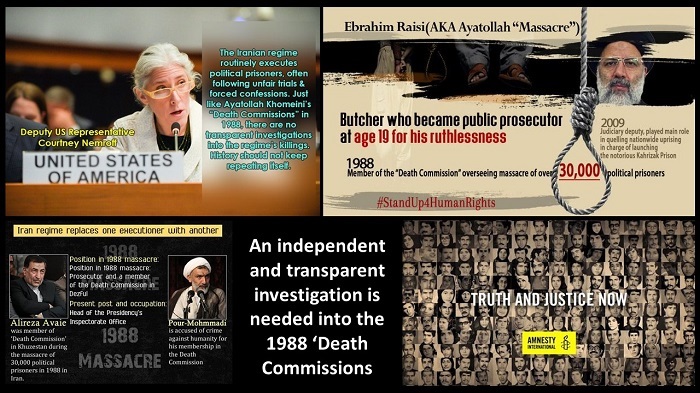
A report compiled by the Special Rapporteur on the situation of human rights in Iran, Javaid Rehman, was reviewed by the United Nations Third Committee Interactive Dialogue on the Situation of Human Rights in Iran on October 26th. A dozen member states attended the review.
The Iranian dissidents and the supporters of the (#PMOI / #MEK) and the (#NCRI) have staged protests in various countries to condemn the execution of Navid Afkari.https://t.co/3LvJ5R0dVx pic.twitter.com/N6Nep1YdAZ
— MEK Iran (Mujahedin-e Khalq) (@MEK_Iran) September 14, 2020
Mr. Rehman expressed concern over the use of violence by the Iranian regime against protesters and the continued failure to uphold basic human rights. Particular mention was made about the 2018 and 2019 protests and the recent execution of Navid Afkari, a popular champion wrestler.
In his annual report to #UNGA75 Javaid Rehman says, despite clear evidence that #Iranian security forces used excessive & lethal force to kill people, including women after a year authorities have failed to conduct investigation complaint! #MEK #Iran #FreeIran2020 pic.twitter.com/tbRVkwPWdj
— MEK Iran (Mujahedin-e Khalq) (@MEK_Iran) October 27, 2020
Mr. Rehman said: “The Government and judiciary appear to be implementing death sentences against protesters to prevent peaceful dissent and restrict civic space. The recent arbitrary execution of Navid Afkari for his participation in August 2018 protests is emblematic of this concern.”
Further concerns about Iran’s human rights violations were made by the U.S. representative to the United Nations Economic and Social Council, Courtney Nemeroff. She called for an independent investigation into the massacre of 30,000 opposition members and supporters of the People’s Mojahedin Organization of Iran (PMOI / MEK Iran), in 1988.
During a conference on the 1988 massacre of 30,000 political prisoners in #Iran, mainly members and supporters #MEK, Dr. Tahar Boumedra former chief of UNAMI and the Secretary-General’s special representative in MEK’s camp, Ashraf in Iraqhttps://mek-iran.com/2020/08/23/11257/ pic.twitter.com/Mue9IqXNzd
— MEK Iran (Mujahedin-e Khalq) (@MEK_Iran) August 23, 2020
Ms. Nemroff went on to say: “The United States is concerned that the Government of Iran continues to deny you access. We call on Iran to immediately allow a country visit. This carries increased importance this year – there have been no independent or transparent investigations into the regime’s killings of up to 1,500 protesters in November 2019. We remain concerned about death sentences imposed following unfair trials and forced confessions reportedly obtained through torture. The most vicious recent example is the execution of wrestler Navid Afkari on September 12.”
Reuters confirmed in a special report on December 23, 2019, about the deadly crackdown on November nationwide protests in Iran the death toll of 1500 that was announced by the People’s Mojahedin Organization of Iran (PMOI / MEK Iran) on December 15, 2019.
Statement by the United States representative, Courtney Nemroff, in the Third #HumanRights Committee Meeting on #Iran and its #HumanRightsViolations.#NoImpunity4Mullahs #IranSanctions@USAdarFarsi @JosepBorrellF @StateDept pic.twitter.com/NjrF3y2DbT
— Kazem (@Kianoosh_sa1) October 27, 2020
The Iranian regime has been emboldened because of the failure of the international community to condemn human rights violations in Iran.
The worst abuse took place in 1988 when MEK supporters were arrested and then executed and buried in secret mass graves. The arrests followed a fatwa proclaimed by the then Supreme Leader, Ruhollah Khomeini. Mock trials are overseen by the so-called “Death Commissions” which led to the arrests and deaths. Several members of the death commissions of that year are still around today, occupying senior positions of power in the mullahs’ regime, like Ebrahim Raisi, who is the current Chief Justice.
Up to 1,500 protestors were killed by the Iranian regime in November 2019. With no independent or transparent investigations into these killings, the regime continues to violate human rights with impunity, as it has for the last 41 years. https://t.co/Ys2qtVsd1g
— Bureau of Democracy, Human Rights, and Labor (@StateDRL) October 26, 2020
The U.S. envoy said on Monday: “This is part of a pattern of impunity that extends back 41 years. An independent and transparent investigation is needed into the 1988 ‘Death Commissions.’ We call on the international community to carry out an independent investigation, including the alleged involvement of the current head of the judiciary and Minister of Justice.”
At the time of #1988Maasacre, Ebrahim Raisi and Alireza Avayi were members of the Death Commissions.
Khamenei and Rouhani were among the regime's top officials @antonioguterres https://t.co/3r5EDFPw3O pic.twitter.com/wUGXTljPwM— Iran Freedom (@4FreedominIran) September 5, 2020
The NCRI’s president-elect, Mrs. Maryam Rajavi, received international attention in 2016 when she initiated the “Justice Movement for the Victims of the 1988 Massacre.”
Time is marching on and in response to the quest for justice, the regime has attempted to destroy any evidence it can of the whereabouts of the mass graves of those executed. The regime will continue to ignore human rights and use brutal repression against any dissenters in Iran as long as the international community turns a blind eye to the atrocities being committed in Iran. Mr. Rehman should be given every opportunity to complete his investigation into the 1988 massacre and current human rights violations in Iran.
MEK Iran (follow them on Twitter and Facebook)
and People’s Mojahedin Organization of Iran – MEK IRAN – YouTube







